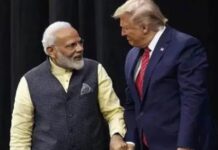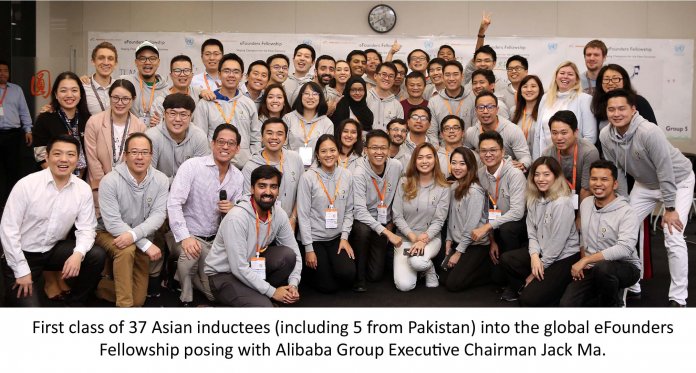The first class of Asian entrepreneurs graduated from the eFounders Fellowship at a ceremony in Hangzhou, China. The program, a joint initiative by the United Nations Conference on Trade and Development (UNCTAD) and Alibaba Business School, aims to enable young entrepreneurs to unlock their full potential and to bridge the digital divide.
With the conclusion of the second eFounders program, Alibaba is now another step closer to fulfilling the commitment made by Jack Ma, founder and Executive Chairman of Alibaba Group, in his capacity as the UNCTAD Special Adviser for Young Entrepreneurs and Small Business. Over the next five years, Alibaba and UNCTAD will help empower 1,000 entrepreneurs in developing countries to use digital transformation for more inclusive and sustainable economic development.

“The energetic spiritand creativity of these young entrepreneurs and the altruistic approach they demonstrate in supporting the Sustainable Development Goals is encouraging,” Arlette Verploegh, UNCTAD’s coordinator for the eFounders Initiative, said.
“Their stories are truly inspirational and provide real-life examples that the young generation can use new technologies to generate economic opportunities for the benefit of their communities,” Ms. Verploegh added.
Out of 37 Asian entrepreneurs who graduated from the program, 5 were from Pakistan, namely:
- Muhammad Komail Abbas, Co Founder of Find My Adventure – A tourism platform that connects local tour providers from Pakistan to local and international travellers.
- Shazil Mehkri, Co-Founder and CEO of Sastaticket.pk – An online travel startup that makes travel bookings easy and transparent for Pakistani Travelers.
- Furquan Kidwai, Founder and CEO of Dawaai.pk – An online pharmacy network providing doorstep delivery for prescription medicines in Pakistan.
- Anum Kamran, Co-Founder of Buyon –An online marketplace enablibng small to medium sized businesses in Pakistan to sell online.
- Hamza Iftikar, COO and Co-Founder of DealSmash –A mobile app for shoppers providing targeted offers based on interests and buying patterns.
Shaping Champions for the New Digital Economy
Throughout the 11-day program, Asian entrepreneurs gained first-hand insights, participated in field visits and attended lectures to understand the digital transformation that has swept China during the last 20 years.
Using Alibaba as the study model, as well as attending meetings with and tours of local incubators and e-commerce business schools, the participants analyzed Alibaba’s ecosystem of platforms and solutions including Taobao Marketplace, Tmall, Alibaba.com, Cainiao Network, Hema and Fliggy, as well as recent industry trends and developments such as New Retail, rural e-commerce and the emergence of Internet celebrities.
Through these interactive and engaging sessions, the participants gained an understanding of the considerations made by Alibaba Group to support and grow the digital economy in China and looked into how they can apply the lessons learned in their home markets.
“We want to empower these budding entrepreneurs with fresh perspectives and provide the tools for success, through practical and theory-based sessions from our best and brightest talent within Alibaba and our network of partners,” said Brian Wong, Vice President of Alibaba Group, who heads the Global Initiatives program.
“It is inspiring to witness the passion in their pursuit for learning,” he said. “Their rigorous discussion of the issues and constant questions about the digital phenomenon in China have enabled them to discover new ideas and approaches for a more inclusive and sustainable development model for their own businesses and for the benefit of their communities back home.”
A unique aspect of the program was accessto top Alibaba executives and successful e-commerce players like PayTM, India’s leading eWallet provider, and Lazada, the largest e-commerce platform in Southeast Asia.
In addition, the participants visited various cutting-edge Alibaba facilities like Hema Fresh to experience a physical representation of the future of New Retail. They also had the opportunity tounderstand smart logistics with a visit to the Cainiao Jiaxing logistics center and appreciate the immense potential of rural e-commerce development at Bainiu Village, also known as China’s Taobao Village after the online shopping website due to the seamless integration of e-commerce with every facet of life there.
The entrepreneurs also experienced the transformative impact of technology on society in China, with visits to the Dream Town incubator in Zhejiang, set to be China’s Silicon Valley, and to Yiwu City, a critical node for wholesale trade for the nation, and the world’s largest offline B2B market.
A Global Fellowship for Communities around the World
At the conclusion of the intensive 11-day program, participants were challenged to share how they plan to impart their new-found insights in e-commerce, e-finance and payments, smart logistics, big data and tourism to fellow entrepreneurs and their communities at home, and formulate improvements to their business ideas.
Pakistani Entrepreneur, Anum Kamran, founder of Buyon.pk, an online shopping marketplace enabling small to medium sized businesses in Pakistan to sell online, talked about her experience, saying, “The journey at AliBaba was a once in a lifetime experience for me. The culture which has been cultivated by Jack Ma, is a one of its kind. Such cultures should be spread around the business community for future ventures to succeed. I am going back with not only learning, but also with strong friendships across cultures and countries. It has been a pleasure being a part of the journey put together with Alibaba and UNCTAD”
Another participant,Furqan Kidwai who established Dawaai.pk, an online pharmacy network, said, “Being a part of the eCommerce community, meeting Jack Ma was a lifelong dream. He is an inspiration to the business community. The culture experienced in China was an eye opener. The manner in which the economy in China is growing due to the tech business sector, is awe inspiring. The culture at Alibaba is one that I have not experienced even after working in Fortune 100 cultures. The credit of the culture and the success goes to Jack Ma and his emphasis on maintaining a strong culture. I hope to implement my learnings back at Dawaai.pk.’
The graduation of the 37 Asian candidates, who hail fromfrom Cambodia, Indonesia, Malaysia, Pakistan, the Philippines, Thailand and Vietnam,means they have been officially inducted as Fellows of the global eFounders Initiativenetwork, joining an inaugural cohort of 24 African entrepreneurs who graduated in 2017.
As part of the commitment by UNCTAD and Alibaba to ensure all Fellows actively apply what they have learned within their communities, both organizations will continue to follow up with the Fellows with the support of local stakeholders every three months, and support the creation of digital ecosystems designed for inclusive and sustainable growth around the world.
For more information on the eFounders Fellowship, please visit:
and http://unctad.org/en/pages/newsdetails.aspx?OriginalVersionID=1615









































